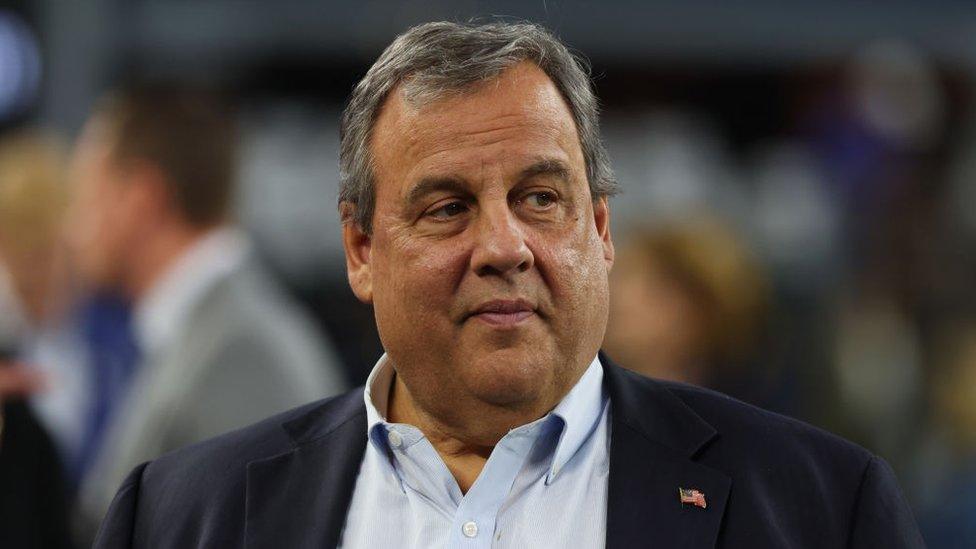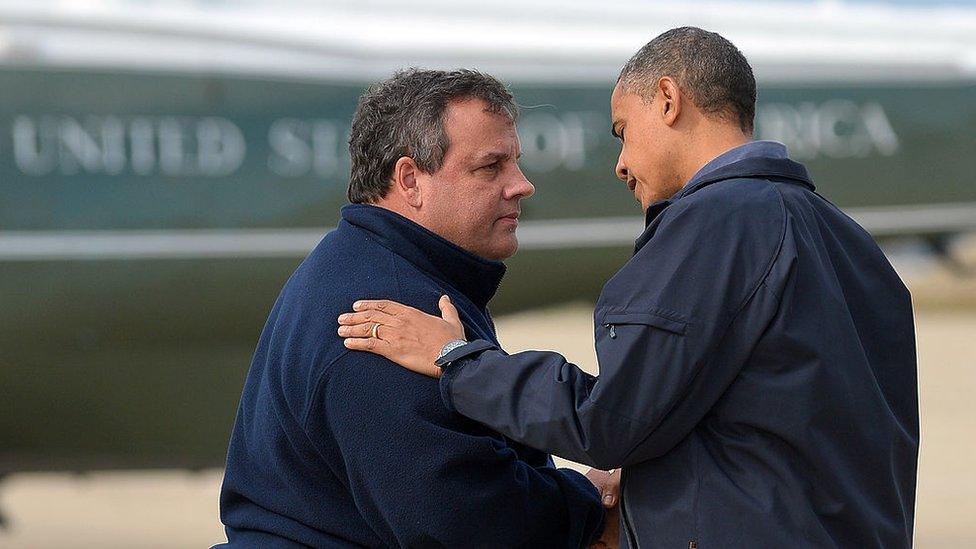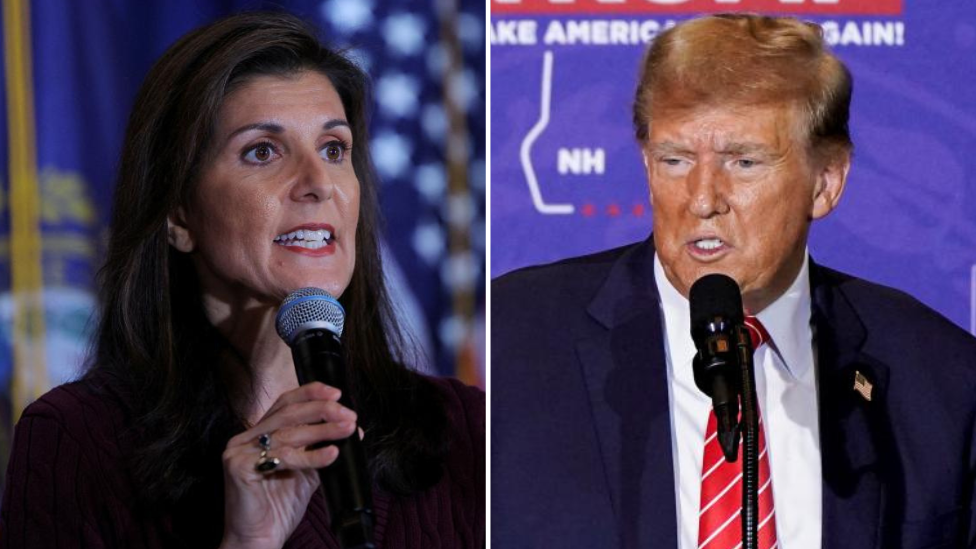Chris Christie: The former governor who wants to be US president
- Published

Chris Christie is running for president a second time
Chris Christie is running for the White House in 2024, a second attempt at the top job. It's another unexpected chapter in a colourful page-turner of a career.
A decade ago, he was a rock star within the Republican Party.
A popular governor in the strongly Democratic state of New Jersey, many thought he was destined to be US president.
Republicans nationally were applauding his fiscal conservatism and even Democrats were hailing his response to the worst storm to hit New Jersey in a century.
That led party bigwigs to urge him to enter the 2012 presidential race - an offer Mr Christie would fatefully turn down. He was easily re-elected governor the following year but the remainder of his governorship was mired in scandal.
He threw his hat in the ring for the 2016 presidential election but dropped out after a poor early showing and endorsed the eventual president, Donald Trump.
The pair have since fallen out and Mr Christie, 60, is now trying to launch his political comeback. But he has an uphill task given his poor approval ratings among Republican voters, external.
Rising star
A New Jersey native, Mr Christie graduated from the University of Delaware then attended law school.
He held elected office in Morris County in northern New Jersey before President George W Bush appointed him US attorney, the state's highest federal law enforcement officer, in 2002.
In that role, Mr Christie secured the indictments of more than 130 political officials and even prosecuted Charles Kushner, the father of Mr Trump's son-in-law Jared Kushner.
Mr Christie left the post in 2008 after Mr Obama was elected president, and soon embarked on a campaign for governor.
In November 2009, he defeated the unpopular incumbent Jon Corzine, a Democrat and former Wall Street executive.
Chris Christie: "Thank you New Jersey for making me the luckiest guy in the world"
New Jersey is a deeply Democratic state that Mr Obama had won with 57% of the vote, and Republicans hailed Mr Christie's victory as a sign voters had begun to turn against the Democrats.
A brash and unflinching adversary, Mr Christie embarked on spirited battles with public employees' unions and with Democrats in the state legislature.
Supporters applauded his willingness to aggressively confront his political opponents but to his critics he was a name-calling bully.
Throughout 2011, he repeatedly rebuffed efforts by prominent conservatives to get him to run for president, saying he was unprepared for the national stage and the rigours of the campaign trail.
He was selected to deliver the keynote address at the 2012 Republican National Convention, the highest-profile spot for a party member not accepting the presidential or vice-presidential nominations.
Mr Christie went on to earn cross-party praise for his response to Superstorm Sandy, which killed 71 people, displaced thousands and devastated miles of New Jersey coastline.
The governor spent the days after consoling residents, attending funerals, publicly praising President Obama for an "outstanding" response to the state's needs and memorably hugging him when he visited.

Governor Christie welcomed President Obama to his state and praised his response to Superstorm Sandy, days before the 2012 election
His approval rating soared to 77%, making him one of the most popular governors - Democratic or Republican - in the country at the time.
In February 2013, Mr Christie underwent lap-band stomach surgery to try to lose weight, furthering speculation he was planning a 2016 presidential bid. He said it was "about turning 50 and looking at my children and wanting to be there for them".
He sailed to a second term as governor that November, winning more than 60% of the vote against his Democratic challenger.
A scandal-hit term
Emails and texts made public in January 2014 linked a top Christie aide to a recent closure of traffic lanes feeding into the George Washington Bridge, one of the world's busiest.
The move had caused traffic chaos in the New Jersey borough of Fort Lee, whose mayor had declined to back Mr Christie's re-election bid.
The staffer in question and three Christie appointees were later indicted over what came to be known as the "Bridgegate" scandal.
Mr Christie denied all knowledge of the scheme but he never recovered his standing.
When he ran for president in 2016, it was clear Republicans had fallen out of love with him. He soon dropped out and endorsed Mr Trump instead, one of the first big names to do so.
He was passed over to be Mr Trump's running mate but headed the New Yorker's presidential transition team, although still failed to get a job in the administration. He said it may have been due to his opposition to the controversial hiring of Michael Flynn as national security advisor. Others said his past as the man who prosecuted a Kushner counted against him.
More scandal followed in 2017, when the governor and his family were photographed enjoying themselves on an empty beach that had been closed due to a government shutdown.
Hot and bothered: How 'beachgate' unfolded
Turning on Trump
Leaving office as the least popular governor in New Jersey history, he joined ABC News as a prime-time contributor, a position Mr Christie has since left to run for president.
In 2020, he had a frightening bout with Covid-19. Overweight and asthmatic, he spent seven days in intensive care. He said it was "undeniable" that he had contracted the virus from Mr Trump during a "super-spreader" White House event.
Later that year, he helped lead Mr Trump's preparations for debates with Mr Biden ahead of the 2020 election.
But he publicly turned on Mr Trump after the January 2021 attack at the US Capitol, criticising his "unacceptable" post-election conduct and his claims the election was stolen.
In recent months, he has argued that Mr Trump "disqualified himself from the presidency" and that Republicans are in need of a winner.
Related topics
- Published21 January 2024
